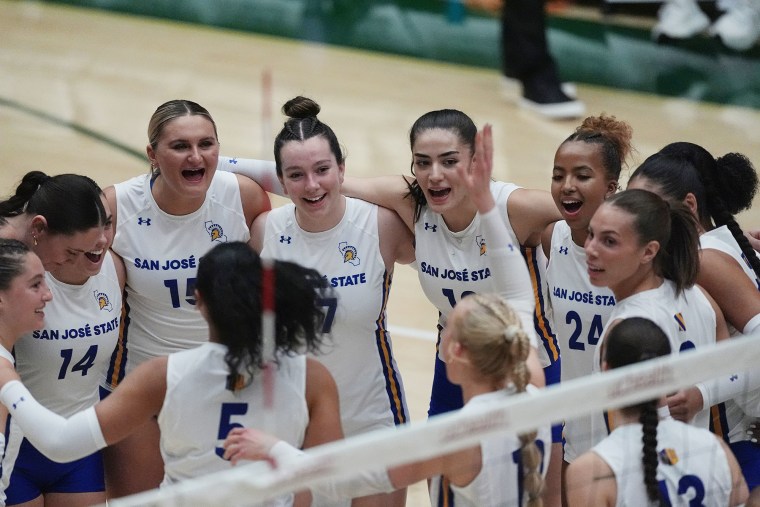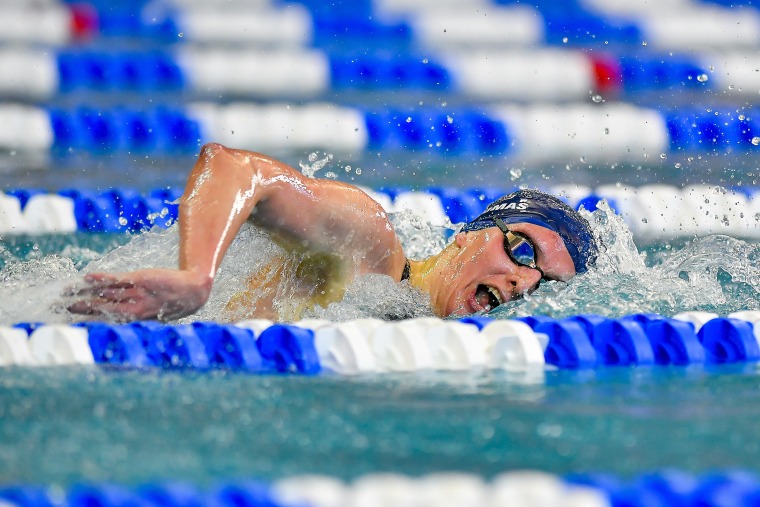New Hampshire’s Fairness in Women’s Sports Act, which was signed into law in July, as well as Trump’s executive order, “excludes, singles out, and discriminates against transgender students and insinuates that they are not deserving of the same educational opportunities as all other students,” Klementowicz said in a statement.During Trump’s first term, the Education Department released federal guidelines on how to implement Title IX, particularly on the issue of sexual misconduct in schools. The rules gave students accused of misconduct added protections, including the presumption that they are innocent throughout the disciplinary process and the right to be provided all evidence collected against them.
The Biden administration devised its own policies by interpreting “sex” in Title IX as being inclusive of “gender identity,” allowing for the protection of transgender athletes who wanted to compete in sports aligned with their gender identity and not their sex assigned at birth.
Trump, however, warned that he would reverse that once taking office. His executive order prohibiting “gender ideology” explicitly states that sex means the “immutable biological classification as either male or female” and “does not include the concept of ‘gender identity.’”
For K-12 schools and colleges that don’t adhere to the Trump administration’s interpretation of Title IX standards, it could mean the loss of federal funding, including grants to their educational programs.
While so far, no school at any level has had its federal funding rescinded, the Education Department has begun to investigate potential civil rights violations related to Trump’s executive order.
A day after it was signed, the department announced inquiries at San Jose State University and the University of Pennsylvania as well as the Massachusetts Interscholastic Athletic Association.

San Jose State is being investigated over the participation of a player on the women’s volleyball team, although the school has not confirmed the team has a transgender athlete.
The review at the University of Pennsylvania involves Lia Thomas, a former student who in 2022 became the first trans woman to win an NCAA swimming championship. Thomas graduated in 2022, but her participation is the subject of a lawsuit filed by several athletes last year and another one this month by three former teammates suing the NCAA and others in an effort to have Thomas’ swimming records repealed.
The NCAA declined to comment, citing pending litigation, but said in a statement that it “will continue to promote Title IX, make unprecedented investments in women’s sports and ensure fair competition in all NCAA championships.”
A day after Trump signed his executive order, NCAA President Charlie Baker announced the association was changing its policy to allow only student-athletes assigned female at birth to participate in collegiate competitions. He said in a statement that “uniform eligibility standards would best serve today’s student-athletes instead of a patchwork of conflicting state laws and court decisions,” and that the order “provides a clear, national standard.”

Nationwide, the number of trans athletes competing in college sports is relatively small. While the exact number is unknown, Baker told congressional lawmakers in December that he was aware of fewer than 10 in the NCAA, which has more than 500,000 student-athletes.
On Wednesday, the Education Department announced investigations of two more groups — the Minnesota State High School League and the California Interscholastic Federation — alleging that the state governing bodies plan to violate Trump’s executive order.
“I would remind these organizations that history does not look kindly on entities and states that actively opposed the enforcement of federal civil rights laws that protect women and girls from discrimination and harassment,” Craig Trainor, the department’s acting assistant secretary for civil rights, said in a statement.
The Minnesota State High School League, which has allowed transgender student-athletes to compete on a team that aligns with their gender identity since 2015, said in a statement it would cooperate with the investigation while seeking “clarification and direction” from the state attorney general.
The California Interscholastic Federation declined to comment on pending investigations, but said it does not collect data on transgender student-athletes.
Before Trump’s executive order, more than half of states already had measures in place to restrict trans athletes from playing on teams that align with their gender identities. Courts have blocked bans in four of the states: Arizona, Idaho, Utah and West Virginia.
Elsewhere, the debate continues.
In Indiana, a House education committee on Wednesday advanced a bill that bans transgender women from competing on female college sports teams, similar to a ban in K-12 sports passed in 2022.
Ultimately, all but one Democrat on Indiana’s House education committee voted in favor of the college ban, but some in the party voiced their struggle with how supporting both athletes who were assigned female at birth and trans women and girls has become politicized, when previously sports bodies such as the NCAA had been in a position to govern themselves.
“We don’t have to do any of this,” said Rep. Ed DeLaney, a Democrat who voted for the bill. “It’s overreach and virtue signaling, and it’s just a waste of our time.”
Trump’s executive order appears to be having an influence beyond U.S. borders and school sports.
One week after it was signed, World Athletics, the international governing body of track and field, announced it would recommend placing athletes assigned female at birth who have higher testosterone levels under the same rules barring transgender athletes in female categories.
Meanwhile, the International Boxing Association, a Russian-led boxing governing body that has been banished from the Olympics, cited Trump’s order in an announcement last week saying it would file criminal complaints against the International Olympic Committee for allowing boxers Imane Khelif and Lin Yu-ting, who were assigned female at birth and identify as women, to compete and win gold medals at the 2024 Paris Games. Trump has often misgendered the boxers.
During the signing ceremony for his trans sports executive order, the president was upfront about his intention of taking his fight against transgender athletic participation to the Olympics. He said he wants the departments of State and Homeland Security to review policies around admitting male athletes into the U.S. “seeking to participate in women’s sports” and the IOC to “change everything having to do with the Olympics and having to do with this absolutely ridiculous subject” ahead of the 2028 Summer Games in Los Angeles.
It remains exceedingly rare for openly transgender athletes to compete in the Olympics.



